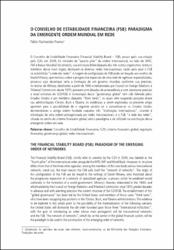Please use this identifier to cite or link to this item:
https://repositorio.ipea.gov.br/handle/11058/7384Full metadata record
| DC Field | Value | Language |
|---|---|---|
| dc.contributor.author | Franco, Fábio Guimarães | - |
| dc.date.accessioned | 2017-01-06T16:51:32Z | - |
| dc.date.available | 2017-01-06T16:51:32Z | - |
| dc.date.issued | 2017-01 | - |
| dc.identifier.uri | http://repositorio.ipea.gov.br/handle/11058/7384 | - |
| dc.description.abstract | O Conselho de Estabilidade Financeira (Financial Stability Board – FSB), pouco após sua criação pelo G20, em 2009, foi rotulado de “quarto pilar” da ordem internacional, ao lado de OMC, FMI e Banco Mundial. No entanto, sua estrutura difere daquela dos três outros organismos: entre os membros desse novo órgão, destacam-se diversas redes transnacionais, razão pela qual o FSB se autointitula “a rede das redes”. A origem da configuração do FSB pode ser traçada aos escritos de David Mitrany, que teorizou sobre a progressiva expansão de uma rede de agências especializadas, processo cujo desenlace seria a formação de um governo mundial, conforme sua previsão. As teorias de Mitrany, idealizadas a partir de 1940 e reelaboradas por Council on Foreign Relations e Trilateral Commission desde 1970, preveem com décadas de antecedência e com alarmante precisão a atual estrutura do G20/FSB. A instauração dessa “governança global” tem sido liderada pelos Estados Unidos e por membros daqueles “think tanks”, os quais vêm ocupando posições-chave nas administrações Clinton, Bush e Obama. As evidências a serem exploradas no presente artigo apontam para a possibilidade de o seguinte cenário vir a concretizar-se: os Estados Unidos desmantelarão a antiga ordem fundada naquelas três “instituições internacionais”, visando à introdução de uma ordem protagonizada por redes transnacionais; e o FSB, “a rede das redes”, situada no centro do sistema financeiro global, será o paradigma a ser utilizado na construção dessa emergente ordem em rede. | pt_BR |
| dc.language.iso | pt-BR | pt_BR |
| dc.publisher | Instituto de Pesquisa Econômica Aplicada (Ipea) | pt_BR |
| dc.title | O Conselho de Estabilidade Financeira (FSB) : paradigma da emergente ordem mundial em rede | pt_BR |
| dc.title.alternative | The Financial Stability Board (FSB) : paradigm of the emerging order of networks | pt_BR |
| dc.title.alternative | El Consejo de estabilidad financiera (fsb) : paradigma del orden emergente de redes | pt_BR |
| dc.type | Revista Tempo do Mundo - Artigos | pt_BR |
| dc.rights.holder | Instituto de Pesquisa Econômica Aplicada (Ipea) | pt_BR |
| dc.source.urlsource | http://www.ipea.gov.br | pt_BR |
| dc.location.country | BR | pt_BR |
| dc.description.physical | p. 49-94 | pt_BR |
| dc.subject.vcipea | IPEA::Quadro Institucional::Governo. Administração Pública::Administração Pública::Governabilidade | pt_BR |
| dc.subject.vcipea | IPEA::Comércio::Comércio Internacional::Comércio Internacional - Geral | pt_BR |
| dc.rights.license | É permitida a reprodução deste texto e dos dados nele contidos, desde que citada a fonte. Reproduções para fins comerciais são proibidas. | pt_BR |
| dc.subject.keyword | Conselho de Estabilidade Financeira | pt_BR |
| dc.subject.keyword | G20 | pt_BR |
| dc.subject.keyword | Sistema financeiro global | pt_BR |
| dc.subject.keyword | Regulação financeira | pt_BR |
| dc.subject.keyword | Governança global | pt_BR |
| dc.subject.keyword | Redes transnacionais | pt_BR |
| dc.relation.references | http://repositorio.ipea.gov.br/handle/11058/7378 | pt_BR |
| ipea.description.additionalinformation | Artigo publicado em: Tempo do Mundo: v. 3, n. 1, jan. 2017 | pt_BR |
| ipea.description.additionalinformation | Possui referências bibliográficas | pt_BR |
| ipea.description.additionalinformation | Resumo em português, inglês e espanhol | pt_BR |
| ipea.access.type | Acesso Aberto | pt_BR |
| ipea.rights.type | Licença Comum | pt_BR |
| ipea.englishdescription.abstract | The Financial Stability Board (FSB), shortly after its creation by the G20 in 2009, was labeled as the “fourth pillar” of the international order, alongside the WTO, IMF and World Bank. However, its structure differs from that of the three other agencies: among the members of this new body various transnational networks stand out, the main reason the FSB calls itself the “network of networks”. The origin of this configuration of the FSB can be traced to the writings of David Mitrany, who theorized about the progressive expansion of a network of specialized agencies, a process which he predicted would culminate in the formation of a world government. Mitrany’s theories, elaborated in the 1940s and reformulated by the Council on Foreign Relations and Trilateral Commission since 1970, predict decades in advance and with alarming precision the current structure of the G20/FSB. The establishment of this “global governance” has been led by the United States and members of those same “think tanks”, who have been occupying key positions in the Clinton, Bush, and Obama administrations. The evidence to be explored in this article point to the possibility of the materialization of the following scenario: the United States will dismantle the old order founded upon those three “international institutions”, with the goal of introducing an order whose main protaganist will be transnational networks; and the FSB, “the network of networks”, which lies at the center of the global financial system, will be the paradigm to be used in the construction of this emerging order of networks. | pt_BR |
| ipea.researchfields | Inserção Internacional Soberana | pt_BR |
| ipea.classification | Comércio Internacional | pt_BR |
| ipea.classification | Economia. Desenvolvimento Econômico | pt_BR |
| ipea.classification | Relações Internacionais | pt_BR |
| Appears in Collections: | Comércio Internacional: Artigos Cooperação Internacional. Relações Internacionais: Artigos Economia. Desenvolvimento Econômico: Artigos | |
Files in This Item:
| File | Description | Size | Format | |
|---|---|---|---|---|
| TdM_v3_n1_Conselho.pdf | 228.98 kB | Adobe PDF |  View/Open |
Items in DSpace are protected by copyright, with all rights reserved, unless otherwise indicated.

